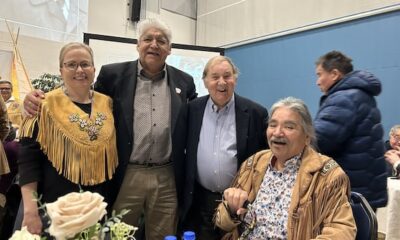Top Stories
Elders in Chisasibi Revitalize Cree Traditions Every Thursday

URGENT UPDATE: Every Thursday, the community of Chisasibi, Quebec comes alive as elders gather to preserve their rich Cree traditions through hands-on workshops. As the scent of Labrador tea and freshly-baked bannock fills the air, these gatherings are more than just a weekly meeting; they are a vital lifeline connecting generations.
Members, including respected elders like Eddie Fireman and Charlie Pepabano, meet at the Mitchuap to carve, knit, and share invaluable life lessons. The importance of these gatherings is underscored by Pepabano, a 74-year-old residential school survivor, who emphasizes their role in reconnecting with classmates and honoring past teachings. “Each thing I make is a way to honor those who taught me,” Pepabano states.
IMMEDIATE IMPACT: These weekly sessions serve as a living classroom where language, tradition, and identity are actively preserved. Participants learn essential survival skills, crafting traditional tools from wood while also sharing stories of life on the land. “We learn by example and by watching others,” Pepabano explains, highlighting the community’s collaborative spirit.
Elder Eddie Pashagumskum, aged 87, reinforces the importance of passing down knowledge. He invites community members, especially the younger generation, to join and learn. “You don’t have to be good at it, but at least you try,” he says, stressing that skill comes with practice.
DETAILS: The workshops unfold around a large woodstove, with women knitting mittens and moccasins while men craft wooden tools. Fireman, who shares his expertise in making wooden snow shovels, elaborates on the intricate process, saying, “You gotta learn how to use your axe and your crooked knife.” He emphasizes that understanding the land and its resources is crucial for survival.
As the world continues to change rapidly, these gatherings become increasingly significant. “If there’s ever a time of social disaster, knowing your language and culture will help you survive,” Pepabano warns. This message resonates deeply as the community faces modern challenges.
CONTEXT: The elders’ efforts are a response to the rapid generational shift. Fireman reflects on how quickly elders pass away, motivating him to learn and teach traditional skills. “All the elders are mostly gone,” he says. This urgency drives the elders to ensure that their knowledge endures for future generations.
NEXT STEPS: As the community looks to the future, they hope to see more young people participating in these gatherings. “The more of the younger generation we see, the better it is,” Pepabano says. The elders believe that instilling these teachings into the youth will empower them to face modern challenges with resilience.
The weekly meetings in Chisasibi are a testament to the strength and responsibility felt by these elders. They understand that their role goes beyond mere storytelling; it is about ensuring the survival of their culture and identity. “You’ll have no worries if you know how,” Pepabano shares, reminding the community of their ancestral wisdom.
In a world that’s constantly evolving, Chisasibi’s elders are ensuring that their traditions not only survive but thrive, making these gatherings a cornerstone of community identity and resilience.
-

 Politics2 weeks ago
Politics2 weeks agoSecwepemc First Nation Seeks Aboriginal Title Over Kamloops Area
-

 World4 months ago
World4 months agoScientists Unearth Ancient Antarctic Ice to Unlock Climate Secrets
-

 Entertainment4 months ago
Entertainment4 months agoTrump and McCormick to Announce $70 Billion Energy Investments
-

 Lifestyle4 months ago
Lifestyle4 months agoTransLink Launches Food Truck Program to Boost Revenue in Vancouver
-

 Science4 months ago
Science4 months agoFour Astronauts Return to Earth After International Space Station Mission
-

 Technology3 months ago
Technology3 months agoApple Notes Enhances Functionality with Markdown Support in macOS 26
-

 Top Stories1 month ago
Top Stories1 month agoUrgent Update: Fatal Crash on Highway 99 Claims Life of Pitt Meadows Man
-

 Sports4 months ago
Sports4 months agoSearch Underway for Missing Hunter Amid Hokkaido Bear Emergency
-

 Politics3 months ago
Politics3 months agoUkrainian Tennis Star Elina Svitolina Faces Death Threats Online
-

 Politics4 months ago
Politics4 months agoCarney Engages First Nations Leaders at Development Law Summit
-

 Technology4 months ago
Technology4 months agoFrosthaven Launches Early Access on July 31, 2025
-

 Top Stories4 weeks ago
Top Stories4 weeks agoFamily Remembers Beverley Rowbotham 25 Years After Murder




















